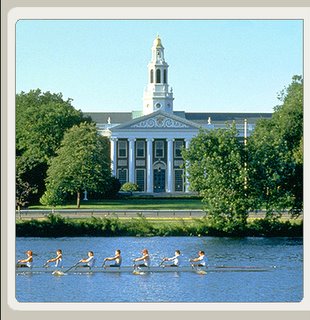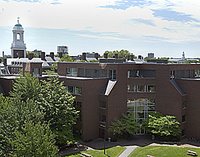 Everytime I walk along the river from my apartment to school, I always stare enviously at the big, luxurious complex of the Harvard Business School (HBS). While the main campus is in the Cambridge side, HBS - and the stadium - is located in the other side. It's a world in its own. We on the other side of the river often call it, sarcastically but enviously, the 'Allston Country Club,' after the neighborhood of Allston.
Everytime I walk along the river from my apartment to school, I always stare enviously at the big, luxurious complex of the Harvard Business School (HBS). While the main campus is in the Cambridge side, HBS - and the stadium - is located in the other side. It's a world in its own. We on the other side of the river often call it, sarcastically but enviously, the 'Allston Country Club,' after the neighborhood of Allston. My Kennedy School of Government (KSG) campus lies just across the river on the Cambridge side. The other Harvard schools and the main Yard is another 5-10 minute walk. It's also a nice place, but nothing compares to the other side of the river in terms of size and luxury. As we often jokingly said, this is how the public (government) sector compares with the private (business) one.
My Kennedy School of Government (KSG) campus lies just across the river on the Cambridge side. The other Harvard schools and the main Yard is another 5-10 minute walk. It's also a nice place, but nothing compares to the other side of the river in terms of size and luxury. As we often jokingly said, this is how the public (government) sector compares with the private (business) one.Speaking of private vs. public sector, students of both school run an annual debating contest between them. The usual theme is "which school produces the real leader?" Or, in a more general term - which one is the real agent of change: business or public sector?
As you know, the U.S. had had great political leaders like Jefferson, Franklin, Maddision, Washington, or Lincoln and Kennedy. But the country was also shaped by businessmen and enterpreneurs like Carnegie, Mellon, Rockefeller, and Bill Gates in the modern world. Of course, each side has its dark side. Enron was just an example of business sector corruption. Or the 1930's great depression showed how (financial) market failure can lead to a global disaster. On the other hand, Nixon's watergate provides a high-profile example of public sector corruption. And we can cite so many examples on how government failure caused greater problems than the market failure (what do you think of the 'aid failure,' Prof. Sachs?).
You can read my note on last year's debate here. This year's debate was not that different with the previous one, so the note is still update.
So, which school provides the true agents of change? The thing is, 70% of HBS graduates work in the consulting firm. They don't really become enterpreneurs - the real private sector agents of change. Most of the KSG graduates still work in the 'public' sector (in a broad term), and some of them go. But still a great portion goes into the private sector, competing with the HBS fellows in the same job market. So I guess, in the end, they are even...
Academic life
No comments:
Post a Comment